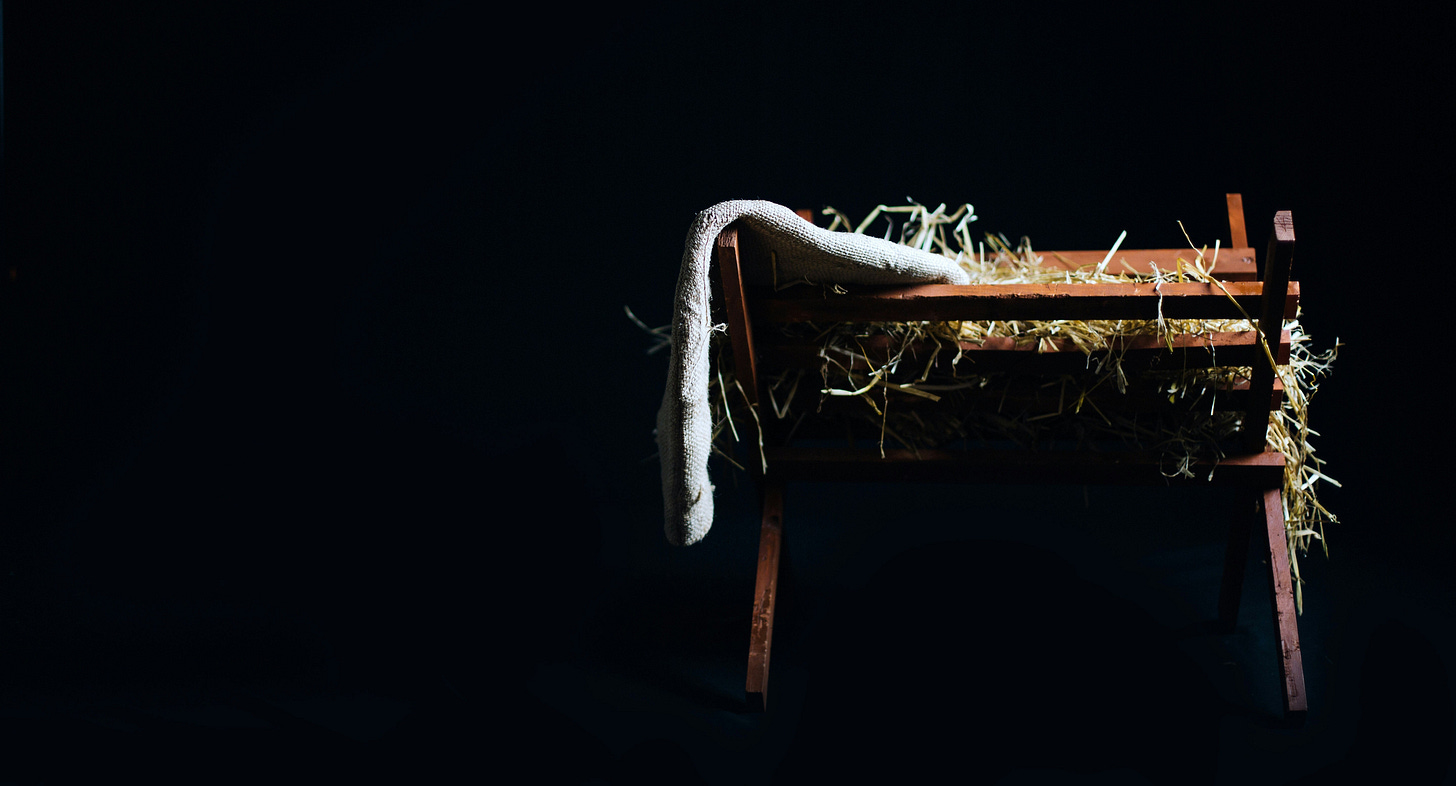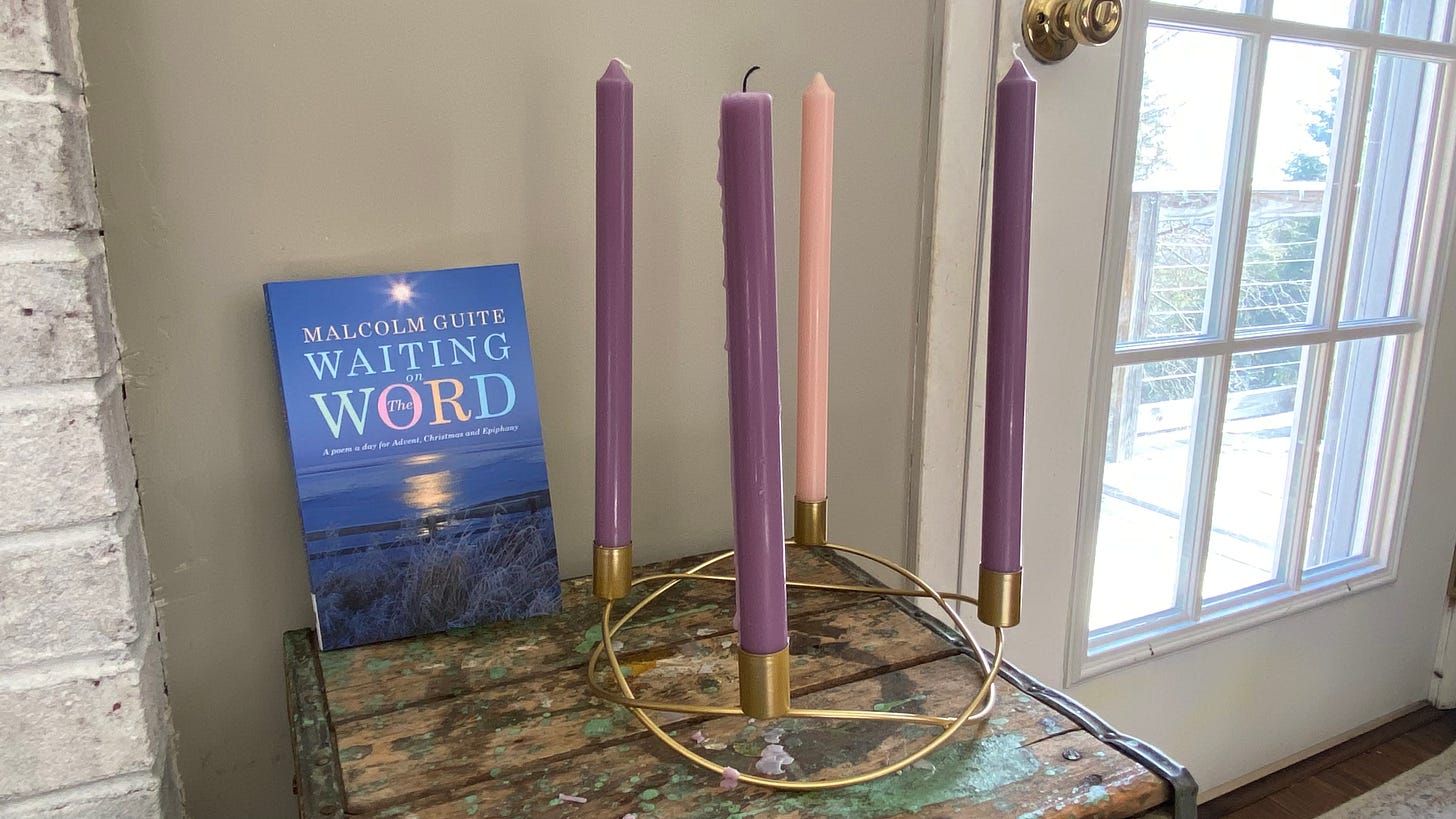
In case you haven’t heard, I’m reviving the Holy Unhappiness Podcast for Advent! For my first episode, I talk about the theme of the first week of Advent -HOPE - and I have a conversation with Ian Harber, author of the new book Walking Through Deconstruction. Ian writes with gentleness and compassion about how excruciating the experience of doubt and deconstruction can be - how it can often leave you feeling bereft of vision, robbed of your hope.
Talking publicly about deconstruction is somewhat new for me. It’s not that I don’t think the topic is important, and it’s not because I’m personally unfamiliar with the journey of deconstruction. It’s just that the conversation around deconstruction is so often fraught, and (unlike Ian’s book) characterized by abstract, intellectual discourse, judgement, and disagreement about terms and definitions.
Frankly, I am skittish to say too much about deconstruction (namely, how one should or shouldn’t go about it) because in recent years, I’ve had so many close friends who, like me, have wrestled with the Christian faith of their upbringing. Some of them have embraced a new expression of that faith, and many have departed from it altogether. I have profound respect for their journeys - their pain, their authentic struggle, their longing for truth, and (for some) the beauty they’ve found in the aftermath. I’ve always wanted this newsletter (and all of my writing) to be a place where anyone could come and grab some “provisions” for their pilgrimage, no matter how different our paths may be.
Part of the reason I honor those journeys is because I know how excruciating they have been. Many set out on the path of deconstruction after decades of witnessing wounds inflicted by the Church. Having grown up in Southern Appalachia, where religion both false and true is woven so tightly into the culture, I know from experience that the Bible Belt has lashed so many people, leaving them scarred by stripe marks of shame and anger.
And for anyone who says that those who are deconstructing simply leave the faith so they can have fun and sin all they want to, let me tell you doubt was the least fun thing I’ve ever been a part of. Nothing in my life has felt more like grief than the slow drip of a faith bleeding out, not because you wanted it to, but because a question…or two…or two hundred sliced a million little papercuts on the body of your believe system.
I honestly thought I might die.
I am thankful to say that it was a loving church that brought me a balm. It was a church that invited me in just to be and to breathe until the bleeding stopped. They transfused me with love and grace, and my faith came back to life little by little. Between the support of that church, the faithful love of my parents and husband, and (I now believe) the persistence of the Holy Spirit, my hope survived.
But while the faith of my youth was on life-support, I will say I considered my options. As a mental exercise, I explored other explanations for the existence of the world, for the human condition. I’m certainly not the only wavering Christian who has embarked on a similar search.
I’ve heard it said that no-one ever really leaves religion altogether, we just adopt new forms of it. As Tara Isabella Burton points out in her book Strange Rites: New Religions for a Godless World (side note: I cannot recommend this book enough, it’s fantastic), saints, sinners, atheists, and the “spiritual but not religious” alike long for the pillars that religion has always provided: meaning, purpose, community, and ritual.
Some turn to activism and social justice to find that purpose and community. Some make nature their religion or turn to neo-paganism for meaning. Others make politics their god (though they rarely ever claim to). Still others ritualize a rigorous health, wellness, and therapeutic self-improvement routine.
To be honest, none of these alternatives ever fully persuaded me, never felt like an adequate replacement to my Christian faith. I found it difficult to take up the cause of activism or social justice without the foundational Christian anthropology that insists all human beings bear the image of God, thereby giving them eternal worth and value. While I cherish my newfound love and respect for nature, I struggled to settle into naturism and physiolatry without the certainty of a Creator, or “unmoved mover” who spoke order into chaos and explains the exquisite, systematic harmony of nature. Politics doesn’t suit me (enough said). While I will always love folklore and ancient traditions, modern paganism felt a bit too unpredictable for me. Finally, the wellness movement seemed every bit as legalistic as the works-based righteousness so common in conservative Christianity.
But the truth is, I came back to Christianity not simply because the alternatives seemed wanting. I came back because there are some key features of Christianity that I’ve become accustomed to, a few details I am desperate to keep.

Put most simply, I’d grown accustomed to the Incarnation - to worshiping a God who became one of us. I’d gotten used to a God who chose to be born into a colonized nation…to a poor woman whose pregnancy was shrouded in scandal…who was forced to flee under the cover of night as a refugee from a power-hungry dictator…who grew up in a rural area and was likely made fun of for his accent…who at times had no place to lay his head…who was often hungry but loved a good dinner party…who was tempted by sin and contended with God over the call of the cross…who was betrayed and denied by his closest friends…who died a horrible death at the hands of both conservative, religious powerbrokers and exploitative empire.
It was like God - through Jesus - lived the whole story of human suffering. And that feels like a God worthy of trust, a God I can believe in.
“For unto us a child is born,” (Isaiah 9:6) and unto us a Savior - who knows our pain, shares our sorrow, longs for our redemption, is patient with our doubt, is acquainted with our questions, and is paradoxically present in both his humanity and divinity - unto us this Savior is given.
It is a story so revelatory that I eventually decided I couldn’t take it in bits and pieces, couldn’t appropriate the parts I liked (see the above) but then ignore the parts that were confusing or uncomfortable. I don’t think any religion should ever be partitioned or reconfigured like that. A story like this seemed to deserve to be taken not in part but as a whole.
I know not everyone is compelled or convinced by this story. I know plenty of folks have found other stories more persuasive. I understand that, and I respect it. And maybe I won’t always call myself a Christian. But I suspect I will. The person of Christ, the sacred text of the Bible, and the ancient habits of this faith (prayer, fellowship, and the Lord’s Table), have a hold on me. Call it an “X Factor.” Or call it revelation. But something about this story seems more true than not. And in a world where truth (and hope!) seem to be our rarest and most needed commodities, I’m not going anywhere. At least not yet.
And as long as I’m here…as long as this story keeps seeming to be true to me, I will bear humble witness to it as best I can.
AND NOW FOR SOME PROVISIONS!
It’s that time of year when I release my proudest accomplishment into the world: my annual Spotify Christmas Playlist! I pride myself on curating a list of hope-filled songs, not too cheesy for the somber among us, not too “merry and bright” for those who see Advent as a season of longing and reflection, with just enough clawhammer banjo for the folksy folks and medieval choral undertones for the truly traditional. This is a holiday provision to be sure. YOU ARE WELCOME.
One of my favorite Christmas songs that I always include on my playlist is Liz Vice’s song Refugee King. The lyrics reflect some of the sentiments I shared above.
“Away from the manger they ran for their lives
The crying boy Jesus, a son they must hide
A dream came to Joseph, they fled in the night
And they ran and they ran and they ran
No stars in the sky but the Spirit of God
Led down into Egypt from Herod to hide
No place for his parents no country or tribe
And they ran and they ran and they ran
Stay near me LORD Jesus when danger is nigh
And keep us from Herods and all of their lies
I love the LORD Jesus, the Refugee King
And we sing and we sing and we sing.”
As far as Christmas traditions…
When I was a little girl, we’d spend Christmas at my Granny’s house here in the mountains. I remember that instead of putting a stocking by the fireplace, she would leave her shoes out for Santa. And Santa, after filling my stocking with toys, would fill her shoes with oranges.
The tradition of incorporating oranges into Christmas celebrations has been around since at least the early 19th century. Some believe the golden orange slices are an ode to the story of the original St. Nicholas, in which the generous saint gave three bags of gold to pay for the doweries of three young girls in need (he made this donation by tossing the bags of gold coins down the chimney and into their stockings that were drying by the fire).
During the Victorian Era, the orange fruit was seen as a tasty delicacy. The tradition of gifting oranges (which were mass marketed in the early 20th century) furthered during the Great Depression, when material gifts were scarce, but fruit was an “affordable luxury.” (For more on this, read here).
As for me, I just love the golden glow of a dried orange hanging from my tree or wreath. And it reminds me of my Granny.
Finally, for Advent this year, I’m diving into a book of seasonal poetry curated by British poet Malcolm Guite entitled Waiting on the Word: A Poem a Day for Epiphany and Advent. Drawing on classic and contemporary poets, Guite offers his own takeaways and reflections on each poem - helping us dive deep into the themes and meaning of Advent. And don’t worry, it’s not too late to get started now. The entries take you through the twelve days past Christmas, all the way to Epiphany. So there is plenty of poetry left if you get started now!







As always, Amanda, I'm beyond blessed by your words. And God's grace as you help serve the spiritual and intellectual needs of those who are seeking to better understand their faith—and love God. It is sacred work. And you are the one for it. Also, so glad you are engaging Ian's work. His book is fabulous.
I do love it here, Amanda. Your wise, gentle voice is a deep encouragement in a world of unsettling clamor. I see Jesus in your words.